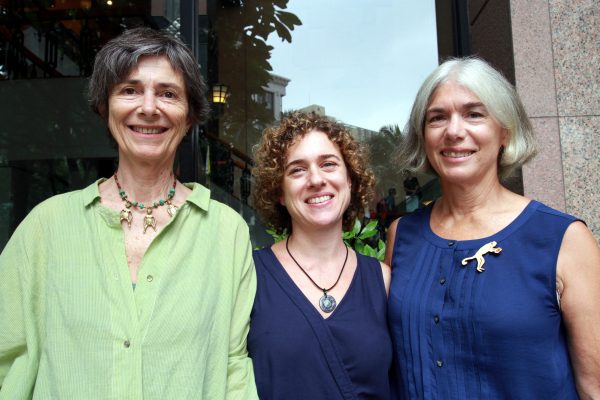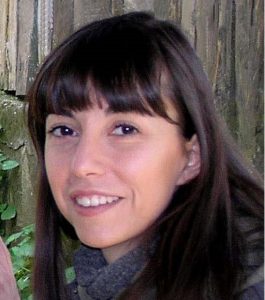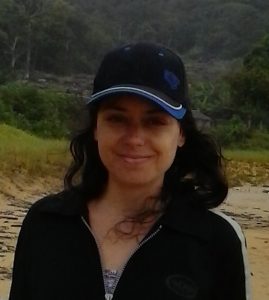RESEARCH DIRECTORS


Dorothy M. Fragaszy
Dr. Fragaszy is Professor of Psychology at the University of Georgia, Athens, Georgia, USA, and Chair of the graduate program in Neuroscience and Behavior in that department. She is an internationally respected primatologist with expertise in behavioral development, cognition, motor skills, problem-solving, and social influences on behavior. She and students in her group work primarily with capuchin monkeys, in captivity in the laboratory at the University of Georgia, and in the field, collaboratively with the EthoCebus research team and with the Boinski research team in Suriname. Together with E. Visalberghi and L. Fedigan, she has just published the first book summarizing knowledge of the behavioral biology of capuchins (The Complete Capuchin, 2004, Cambridge University Press). She maintains collaborations with colleagues working with chimpanzees, conducting parallel studies on spatial cognition and manipulation with capuchins and chimpanzees. She also studies development of percussive tool use and bimanual coordination in young children.
Links:
http://www.uga.edu/psychology/faculty/dfragaszy.html
http://www.uga.edu/psychology/primate/index.html

Patrícia Izar
Dr. Izar is Professor at the Department of Experimental Psychology of the University of São Paulo, Brasil. She obtained her doctoral degree on 1999, with expertise in ecology, social behaviour, social development and methods for behavioural data analysis. She has been studying capuchins in Brazil since 1990, including semifree-ranging groups in Parque Ecológico do Tietê, São Paulo, wild groups in Atlantic Forest, São Miguel Arcanjo, SP collaboratively with Dr. Eduardo Ottoni and their students, and more recently in the Cerrado/Caatinga, in Gilbués, Piauí, with the EthoCebus research team. Together with E. Ottoni she has been one of the main Brazilian researchers on capuchin behaviour, participating on several symposia about capuchin behavioural plasticity. Dr. Izar is the current Brazilian Coordinator of the EthoCebus project.
Links:
http://lattes.cnpq.br/5453327164161334
http://www.researcherid.com/

Elisabetta M. Visalberghi
Dr. Visalberghi is Research Director at Istituto di Scienze e Tecnologie della Cognizione (previously, Institute of Psychology), of the Consiglio Nazionale delle Ricerche in Rome (Italy). Her research on primate cognition has focused on capuchin monkeys, although during her career she has studied several other species in collaboration with scientists from around the world (from homing pigeons to wolves, from titi and squirrel monkeys to bonobos and chimpanzees). In collaboration with Dorothy Fragaszy and Linda Fedigan has the book The Complete Capuchin: The Biology of the Genus Cebus (Cambridge University Press, 2004) and overview of the studies carried out on these South American monkeys. Dr. Visalberghi has authored-/co-authored over 60 journal articles and 20 book chapters in English; she has also written many in Italian, including pieces for newspapers and the popular press and the book Storie di scimmie (La Stampa, Torino, 1995). As scientific advisor she organized the exhibit Primates. Noi e le scimmie, held at the Museo di Scienze Naturali of Turin in 1997. She is a frequent consultant and commentator on television and radio scientific programs and, in 2002, she presented a National Geographic series on Italian television. She supervised several graduate degrees to completion at the Università di Roma "La Sapienza" and has taught in the University Certificate Program of Primatology. At present, she serves on the editorial board for the International Journal of Primatology, Primates, and Folia primatologica. In 2004 she has been elected Secretary General of the International Primatological Society. She is also President of the Italian Ethological Society.
Link:
http://www.istc.cnr.it/createhtml.php?nbr=28
ASSOCIATED RESEARCHERS

Barth Wright
Dr. Barth Wright is a Professor in the Department of Anatomy at Kansas City University of Medicine and Biosciences, Kansas City, Missouri, USA. He obtained his PhD from the Department of Anthropology at the University of Illinois, Urbana-Champaign in 2004. Dr. Wright's dissertation focused on the dietary ecology and trophic morphology of six Neotropical primate species in the Iwokrama Reserve, Guyana, SA. Since then, he has conducted studies of primate dietary ecology in Vietnam, and is presently working with the rest of the EthoCebus team at Boa Vista and at Carlos Botelho National Park, Brazil, SA, and (with Dr. Marilyn Norconk, Kent State University) at Brownsberg National Park, Suriname, SA. The central goal of Dr. Wright's research program is to understand dietary adaptation and ecomorphology of extant and fossil primates, including hominins. His research involves integrating data on a range of ecological parameters (e.g. seasonal food availability and abundance, food selection, the details of ingestive behavior, food structural and material properties) with morphometric and biomechanical analyses of craniofacial and dental morphology. The collection of morphometric and biomechanical data involves a range techniques including finite element analysis (FEA).
Link:
http://www.kcumb.edu/faculty/facultydetails.asp?id=27059

Kristin Wright
Dr. Kristin Wright is an Assistant Professor of Anatomy at Kansas City University of Medicine and Biosciences. She earned her Ph.D. in Evolutionary Biology from Northwestern University in 2005 and completed a Postdoctoral Fellowship in the Center for Functional Anatomy and Evolution at The Johns Hopkins University School of Medicine in 2006. Dr. Wright's research focuses on the relationships among behavior, morphology and the natural environment in primates, with a particular interest in how positional behavior and associated postcranial form relates to foraging. She has conducted field work on positional behavior and habitat use of capuchin monkeys in Costa Rica and Guyana, and has studied the positional behavior and habitat preferences of leaf monkeys in Vietnam. Dr. Wright authored or co-authored articles on the relationship between locomotor behavior and postcranial morphology in capuchin monkeys, capuchins as a model for understanding fallback foraging in primates, and the kinematics of suspensory behaviors and tail postures in Vietnamese leaf monkeys. Her most recent endeavor is a collaborative project with other members of the EthoCebus team, Dr. Jandy Hanna (West Virginia School of Osteopathic Medicine) and Dr. Marilyn Norconk (Kent State University) that focuses on the energetic consequences of ecological, anatomical, and behavioral variability of wild tufted capuchin monkeys in Brazil and Suriname.
Link:
http://www.kcumb.edu/faculty/facultydetails.asp?id=27058

Briseida Dôgo Resende
Dr. Resende is Professor at the Department of Experimental Psychology of the University of São Paulo, Brazil. She obtained her doctoral degree on 2004, with expertise in ethology, social behavior and development. She has been studying capuchins in Brazil since 1995, including free and semifree-ranging groups in Parque Ecológico do Tietê, São Paulo, and wild in Gilbués, Piauí, with the EthoCebus research team.
Link:
http://lattes.cnpq.br/9601221530967113

Valentina Truppa
Dr. Truppa is researcher at the National Research Council of Italy (Institute of Cognitive Sciences and Technologies, ISTC-CNR), Rome, Italy. She obtained her PhD in Psychobiology at the University of Padua working on visual perceptual grouping processes in monkeys and fish. She works primarily with capuchin monkeys, in captivity in the Primate Center of the ISTC-CNR, and more recently in Piauí, with the EthoCebus research team. Dr. Truppa's research mostly focuses on manual functions and perception/categorization of visual stimuli.
Link:
http://www.istc.cnr.it/it/people/valentina-truppa
POSTDOCTORAL FELLOWS

Dr. Michele Verderane is postodoctoral fellow at Department of Experimental Psychology of the University of São Paulo, Brasil. She has been studying capuchins in Brazil since 2000, including semifree-ranging groups in Parque Ecológico do Tietê, São Paulo and wild groups in the Cerrado/Caatinga, in Fazenda Boa Vista, Piauí, with the EthoCebus research team since 2005, and more recently in Atlantic Forest, in Una Biological Reserve, Bahia. Actually, she conducts comparative research on maternal behavior and mother-infant initial interactions of wild capuchin monkeys, supervised by Dr. Patrícia Izar.


